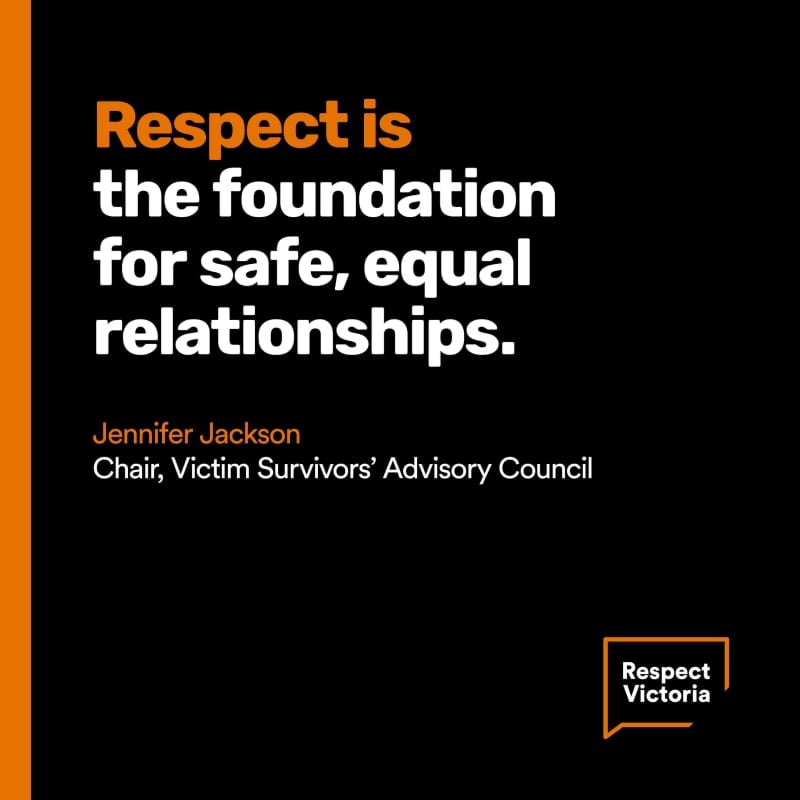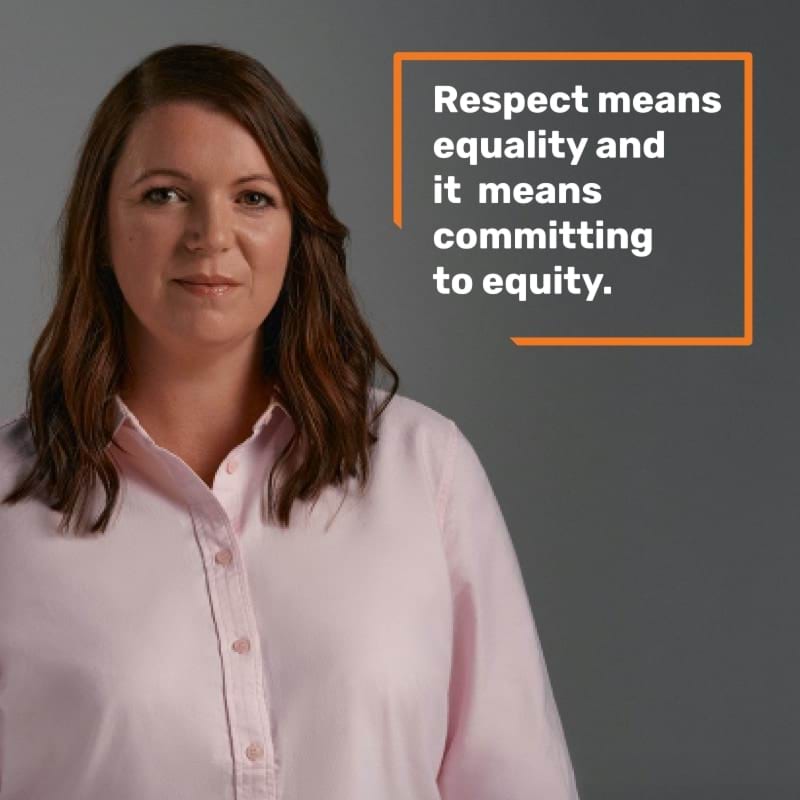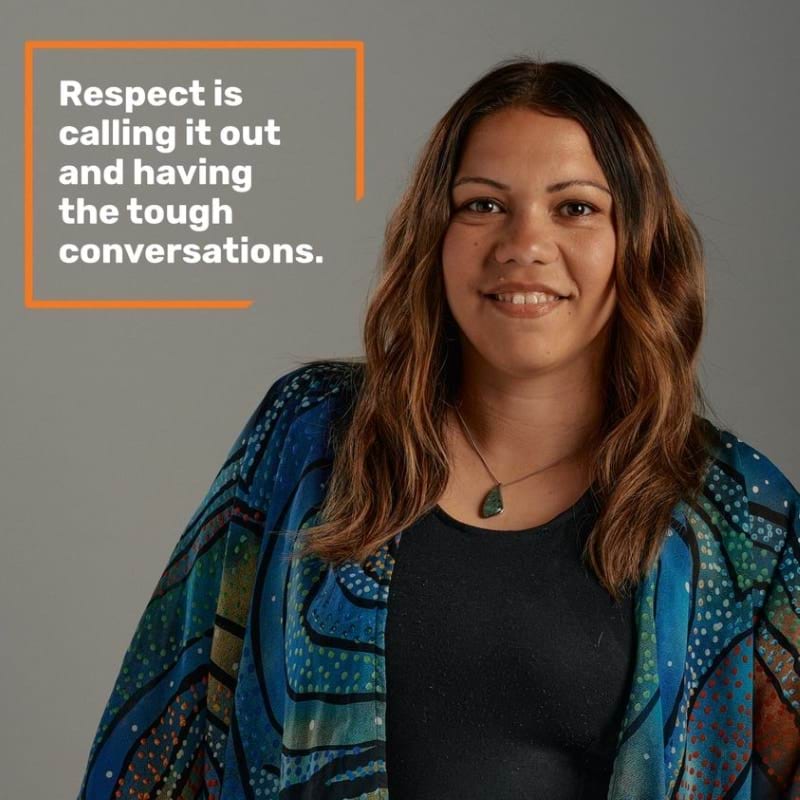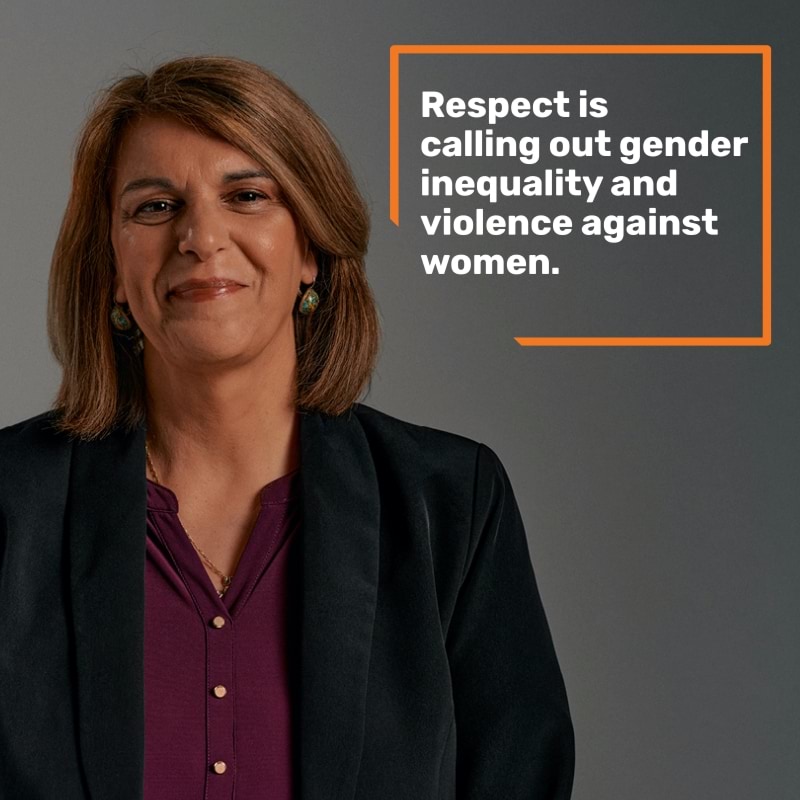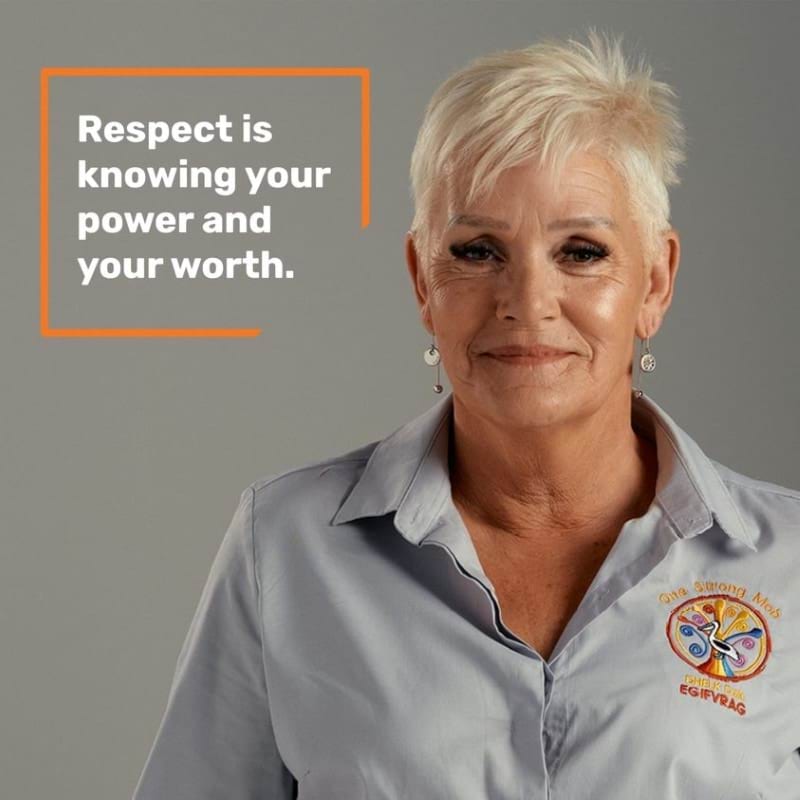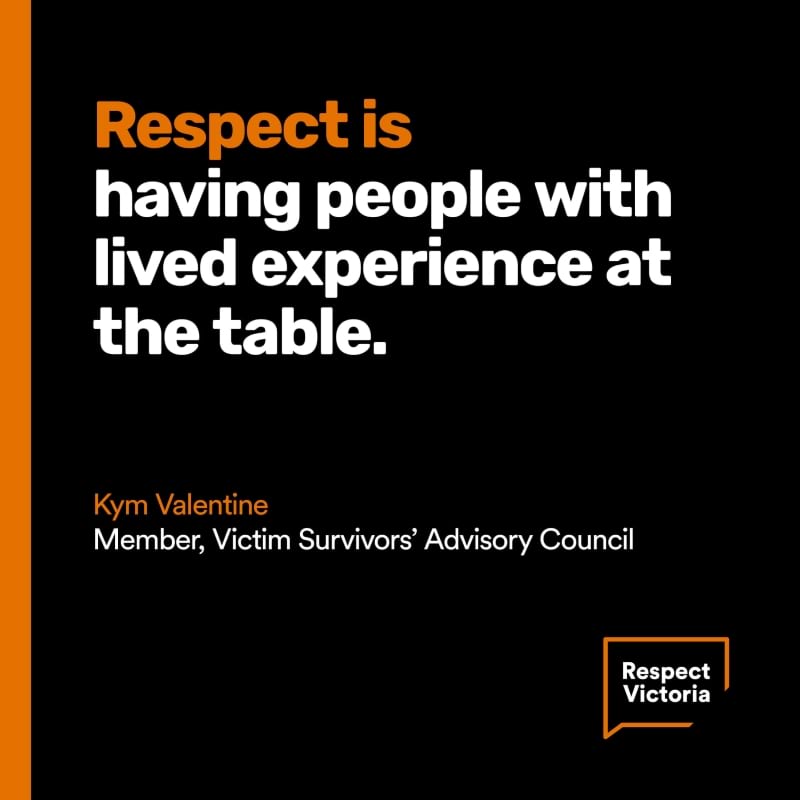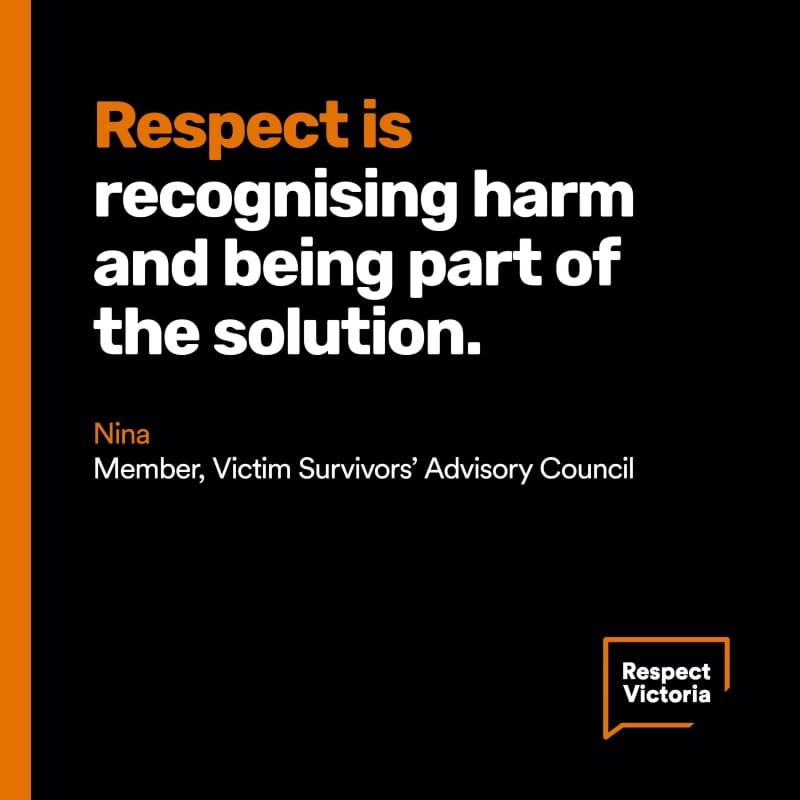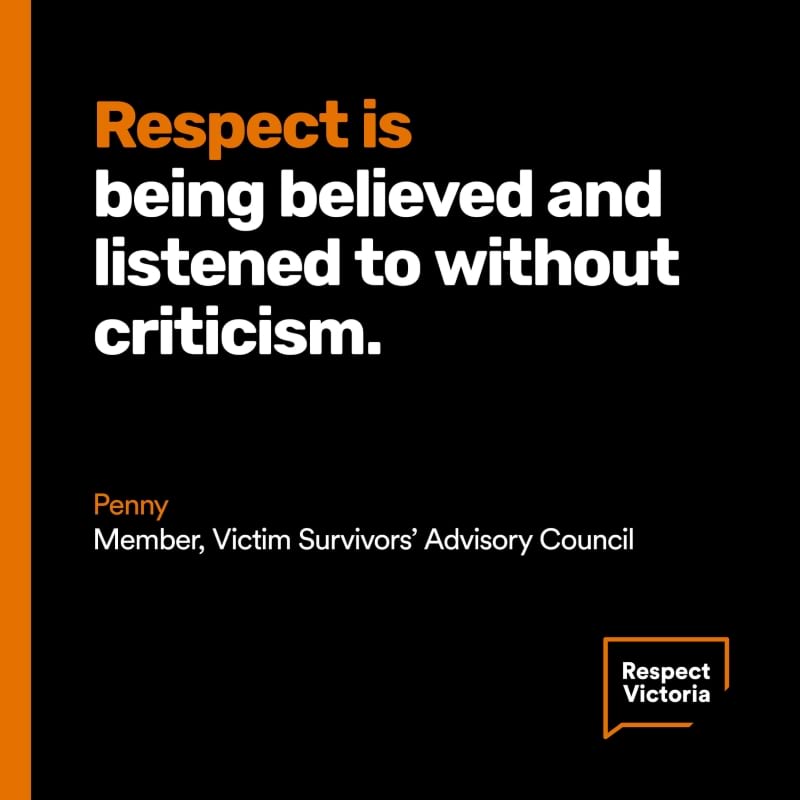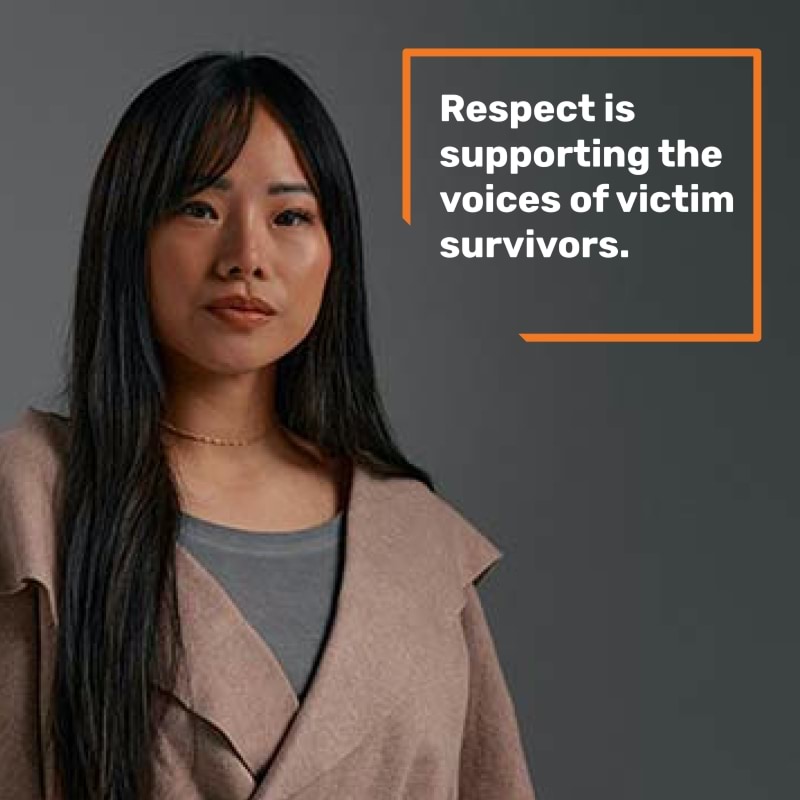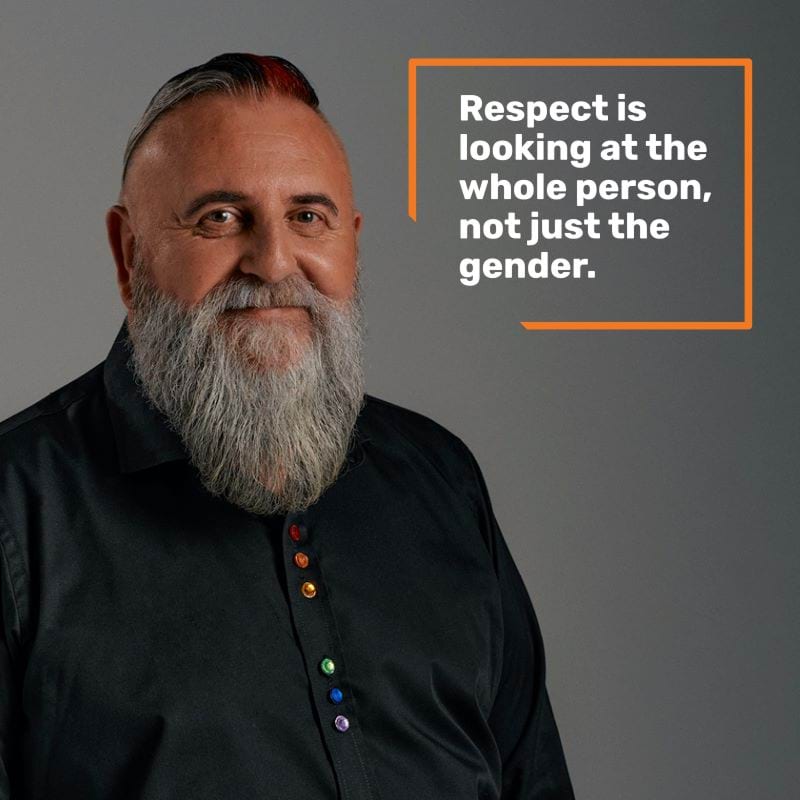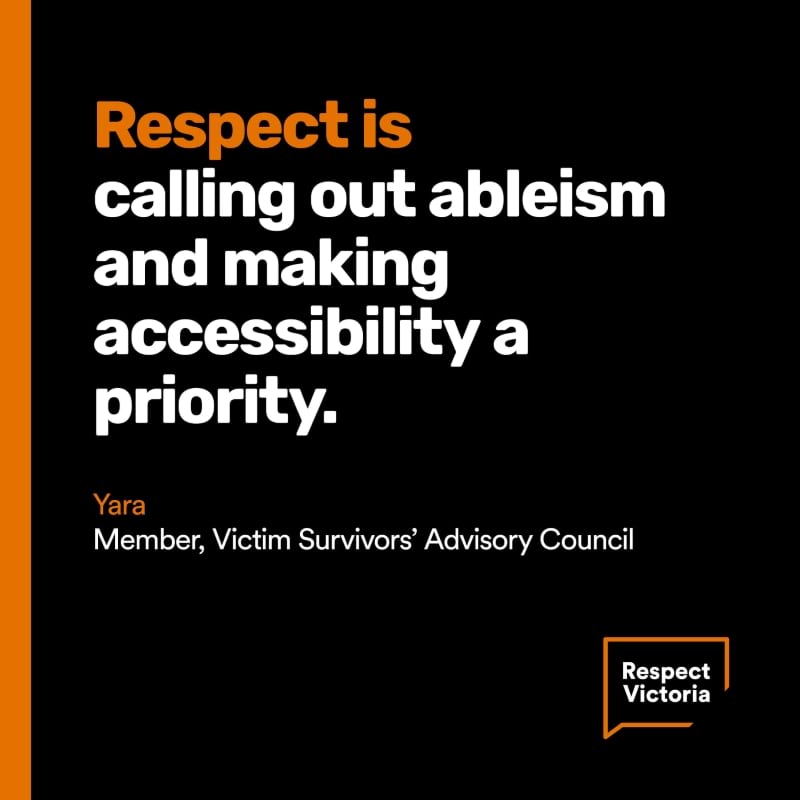- Published:
- Monday 13 December 2021 at 9:00 am
Jennifer Jackson (Chair)
Respect is the foundation for safe, equal relationships.
Respect is the foundation for the way that we treat, react to and respond to others. By building on a foundation of respect, we create strong, safe and healthy relationships. Respect is the core of our behaviour in personal relationships, in community, in our workplace and social settings.
Respect for others is not bound to productivity, talent or behaviour but it is something that we all deserve because we are human beings. We know that disrespect causes damage. We see that reflected in family violence statistics and in many other areas of life, like the state of our planet. Disrespect leads to chaos and harm whereas respect allows for harmony, equality and the best for all of us.
By beginning with a foundation of respect, regardless of how different our worlds or experiences are, we can work towards a future where we are all free from disrespect and violence.
Geraldine Bilston (Deputy chair)
Respect means equality, and it means committing to equity. Respect is about valuing people and seeing them as their whole selves. It's about centring dignity. And it’s about committing to the actions that will create a future where equality is a reality.
We can talk about women's safety, we can talk about 10-year plans, but what we need is action.
I think that the system and community attitudes are changing, but we still have a way to go. In this country, we have a history of outdated views that are very blokey, that don’t value women. We don’t have a lot of examples of healthy masculinity, and we need to start seeing leaders who model respectful, nurturing forms of masculinity.
I believe in a future where everyone is safe and respected, and I know that is achievable because family violence is completely preventable. When I look at my daughter, who will be an adult in 10 years, I don’t want to think that we might just be talking about another plan without much change. I want a different future for her – where she is safe and happy in the world, the workplace, in her relationships, and in her home. That’s my motivation.
Ash
It's acknowledging that we all 'do' life differently and making sure we check in with ourselves about the unconscious biases we hold. Discrimination, disadvantage and inequality come in many forms - and it's important that we are aware of our own privileges.
We glorify self-sabotage, sacrifice, and not choosing yourself when it comes to women - as mothers, as partners. That is where disrespect begins. Recognising unhealthy patterns and behaviours and putting a stop to them, so it doesn't trickle down to future generations - that is respect.
Adjusting to life here as a migrant, I regularly experience discrimination and am often put in a box. Respect is walking alongside people of different races, gender, sexuality or experience and going on a journey to find out what the world looks like for them. It's being gentle and showing warmth and curiosity when working or speaking with victim survivors.
Chantelle
It’s knowing that equality should start within our own communities. It’s about acknowledgement and accountability and owning your mistakes. To stop violence from happening and make sure victims are getting the respect they deserve, we have to talk about it and have the tough conversations.
We need to start seeing men holding each other to account and speaking up when something isn’t right. Even if you don’t think it’s your place, or don’t think it will matter, calling it out can lead to a positive ripple effect. Culture and community can play a big part in keeping everyone safe, and we have a responsibility to kids to set the right example.
By teaching kids about boundaries and limits, respecting other people’s spaces, we can plant the seed to show them what respectful relationships, friendships and families can look like.
Grace Donato
Respect is calling out gender inequality and violence against women. It's speaking up when something doesn't look or feel right, and when you know someone’s actions or words could be harmful.
We’re only just starting to learn as a community about the patterns of control that people can use in violent situations – whether it’s during the relationship, or afterwards.
It’s important that young people are taught early about coercive control, including the use of threats and emotional abuse.
And it’s important that we teach gender equality from the beginning, particularly for young men.
We must teach boys that respect is knowing that you don’t have ownership over anyone else and that it’s important to call out concerning behaviour when you see it or hear it.
Katrina
Respect is knowing your power and your worth. We underestimate ourselves as women, and we often feel like we have to work twice as hard to get respect, to be heard, to be seen as successful.
As Aboriginal women, it’s even more challenging. As an Aboriginal woman with a disability, I felt like I had to work ten times harder to gain respect from everyone around me, and I was judged because of my ex-partner. I work in family violence now, and I always tell clients: it’s all about taking the first step.
We can be our own worst enemies, and not see the value in ourselves. Violence was never our culture. There’s a saying we use – hands are for holding, not hitting. Anyone who uses violence is making a choice, but we must also recognise and deal with colonisation as a driving factor for violence, and the trauma that it has brought. Aboriginal women and Aboriginal communities – we’re worth more, and we must call that out.
Kym Valentine
When designing policies or making decisions that affect people, we need to involve those with lived experience at the heart of it. It's only through listening to them that we can work out where the system is failing – because the past is the best predictor of the future.
It all starts with the little things. I have a 5-year-old boy, and we model consent with him at home – he can’t jump on me unless he asks and gets a ‘yes,’ and if he doesn’t want a kiss or a cuddle he just has to say ‘no.’ It’s important to learn how to receive rejection or a boundary, and to do it with grace.
Identifying the warning signs of abuse or violence and making sure we teach our kids how to respect others from the get-go is the key. We can all make a commitment to take action in our own lives to stop abuse from happening, or to call it out when we see it.
Nina
It’s being honest, open, willing, and being able to take on criticism. It’s acknowledging that everybody has a story, and we all experience harm. It’s unlearning your privilege, making a choice not to use violence and choosing to seek help. Respect is looking beyond punitive measures to solutions that support change and growth.
Judgement, isolation, finger-pointing – shame doesn’t help anyone. Shame keeps both survivors and perpetrators in the shadows and on the margins, and makes people feel like they can’t seek help. Leading with respect means choosing not to discriminate based on a person’s lived experience, so that we can all get the care we need.
Penny
It’s not discriminating against or marginalising others, and it’s listening carefully with intent. Respect is connecting with people of all ages and making sure that people have access to help early, when they need it. It’s making sure that older people are aware of the warning signs of elder abuse and know how to seek help if they wish to. And respect is ensuring that older people, particularly women, are afforded a voice and agency.
Most of the older women I know are a lot more vocal than we used to be. We have all experienced harassment in some form throughout our lives, and we’re slowly starting to share our stories with each other. Many of us are no longer interested in dealing with sexism or ageism, and I don’t allow those qualities to be part of my life. Sometimes we are made to feel silly because we are older, and we’re spoken to or treated differently.
Respect is knowing that age is just a number and treating us as equal.
Rebecca Hoo
Respect is enabling and supporting the voices of victim survivors. It’s about standing in the gap and speaking up when others can’t.
When we as a community are silent about discrimination, sexism and abuse, we ultimately enable family violence. Speaking up and calling it out is not a comfortable task, but by embracing the uncomfortable we can prevent violence.
One small act of calling out family violence can change, and even save lives. We must educate ourselves and others about the warning signs; it is only when we know how to identify family violence that we can create change.
Respect is about elevating the voices of those who have encountered violence, because change comes from making the invisible, visible. As a society, we must stand together in the gap and say: enough is enough.
Russ
Respect is knowing that the drivers of violence are complex and affect all of us, but in different ways. Family violence doesn’t discriminate based on gender identity, sexuality, age, or ability. The sooner we see beyond the categories and recognise that there are people at the core of this, the sooner we will be able to prevent violence from happening.
It’s no longer good enough for LGBTIQ+ people or those in other marginalised groups to be an afterthought in the broader family violence conversation, or to have to fight to get support.
Intersectionality isn’t just a word; we must start practising it and ensure that nobody is left behind.
We need to transform the willingness to support marginalised communities into preparedness and action and remember that gender inequality affects us all in our own way. When we recognise that ALL people deserve equity – that’s what it looks like to lead with respect.
Yara*
It’s striving for an inclusive and accessible future, where no disabled survivors are forced to choose between violence in their home, and violence on the streets due to a lack of accessible long-term housing.
Respect is working towards creating a future that is accessible to people with all types of disabilities. A future where disabled people can live free from all types of violence and abuse, where no one is trapped in their homes due to a lack of accessible public transport and lack of support, where no one is left out of sight, out of mind, or neglected.
Respect is equal opportunities and equal representation, and seeing us for who we are, not for our disabilities. Respect is embracing all diversities, abilities, cultures, languages, genders, sexualities and people. Respect is not putting disabled women down, just for being who we are.
*Not her real name.
Updated
